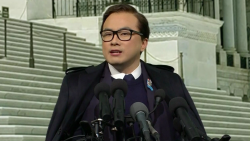In an at-times tense town hall with staff, leadership at The New York Times on Friday addressed the process that led to the publication of Republican Sen. Tom Cotton’s controversial op-ed — a piece that ignited furious debate inside and outside of the newspaper.
James Bennet, the editor of the editorial page, announced in the meeting that Cotton’s op-ed, posted online Wednesday, would not be published in print on Sunday as had been initially planned, multiple staffers who watched the virtual town hall told CNN Business.
Bennet, who apologized for the debacle, added that The Times would append an editor’s note to the online version of Cotton’s piece, the people said.
Cotton’s piece, published with the title “Send In the Troops,” argued the Insurrection Act could be invoked to deploy the military across the country to assist local law enforcement with unrest sparked by the death of George Floyd.
The op-ed was published in The Times’ opinion section, but staffers from both opinion and the newsroom — which operate separate from one another — publicly dissented this week.
Despite The Times issuing a statement Thursday evening saying the op-ed didn’t meet the newspaper’s standards, it was still online Friday afternoon with no updates and without an editor’s note.
Spokespeople for The Times did not dispute the details contained in this story. Caroline Tabler, Cotton’s communications director, told CNN Business that The Times had not communicated with the senator’s office since Thursday evening.
Present at the Friday town hall were A.G. Sulzberger, publisher of The Times, Dean Baquet, executive editor, Joe Kahn, managing editor, Mark Thompson, chief executive officer, and Bennet.
Sulzberger, who had issued a tepid defense for publishing the op-ed on Thursday, said at the town hall that Cotton’s piece should not have run at The Times, people on the call said.
Bennet, according to two of the people on the call, acknowledged to staff that he had not personally read the piece prior to its publication, though he said it had been reviewed by senior editors, and said the process “broke down” and was “rushed.”
Bennet —who the staffers on the call described as appearing “troubled” and “shaken” — had published an article defending the decision to run Cotton’s op-ed less than 24 hours before his comments.
Bennet said that conversations with his black colleagues affected his thinking, according to one of the people on the call.
Both Bennet and Sulzberger said that the op-ed process was inadequate for the current moment and had structural problems, a separate person on the call said.
Bennet was asked about tweets from Bari Weiss, a writer for the opinion section. In a series of Thursday tweets, Weiss said there was a “civil war” inside the newspaper between “wokes” and older “liberals.”
Bennet expressed displeasure with Weiss’ tweets. Weiss did not immediately respond to a request for comment.
Baquet, who leads The Times’ newsroom, opened up to colleagues about his own experience as a black man in America, two of the people on the call said.
Baquet told staff that he occupies a position of significant influence in journalism, but that when he walks on the street in jeans and sneakers, he is viewed differently in society’s eyes.


























